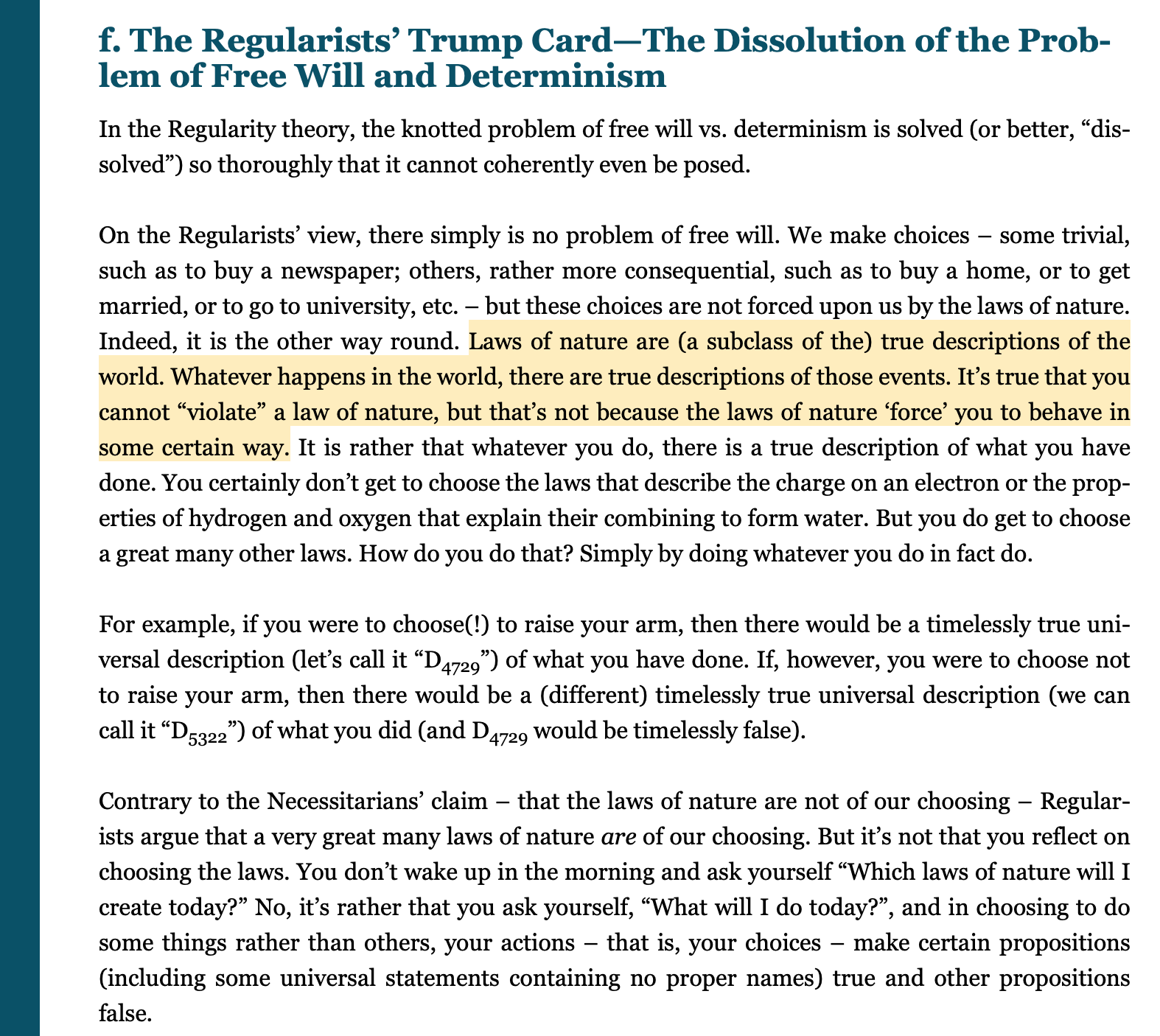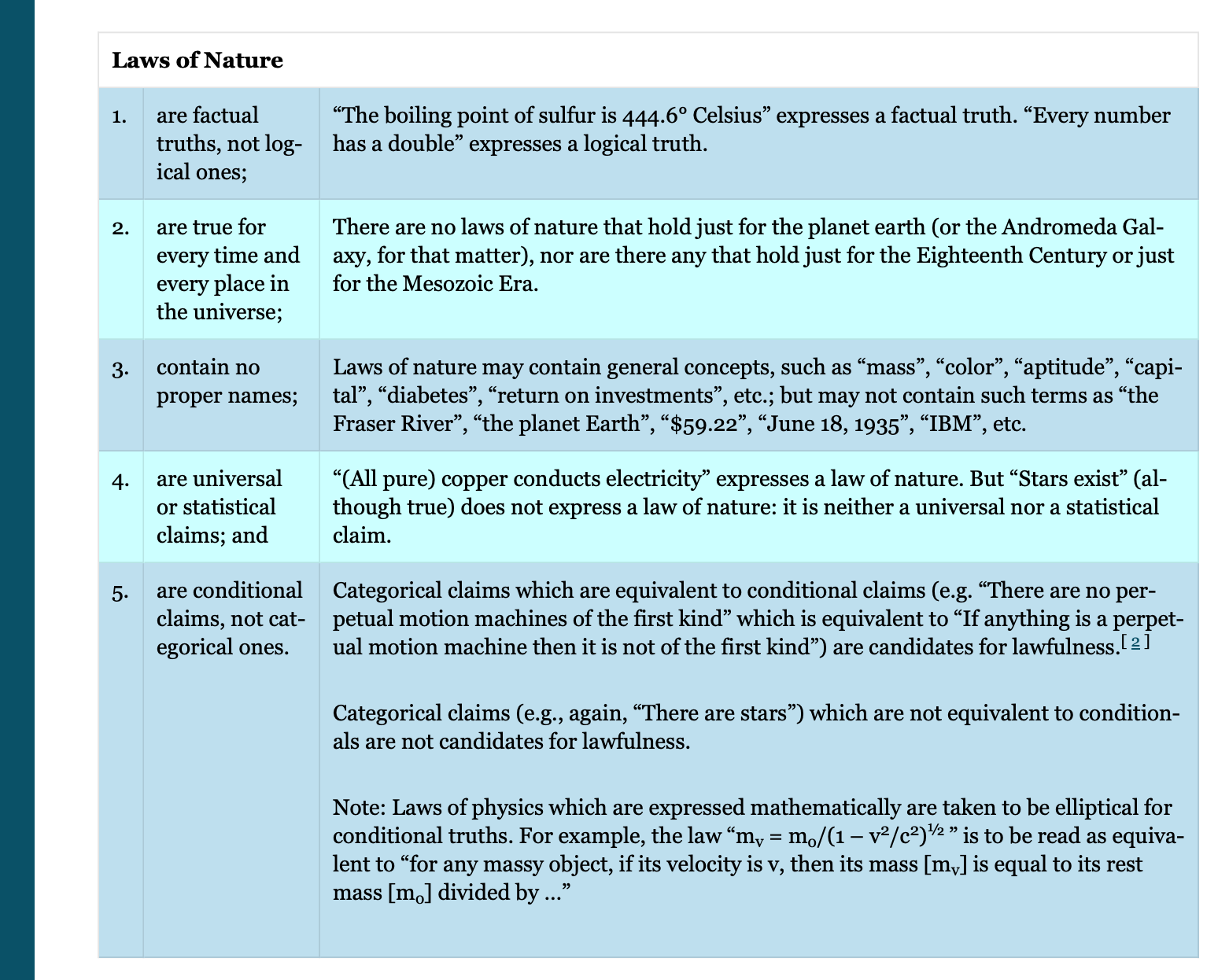Regularity

I was doing research on the following question:
Are there any inviolable laws of the universe?
As I was trying to understand if the laws of nature, as we know it, are constant, or changing.
You might remember this concept from my article on writing magic in fantasy worlds.
In a line, I advocated for starting with the impossible, and refining that 'lack of existence', until something logical is conceived.
Turns out, my view aligns with Regularism, and this topic is an old debate between that idea, and Necessitarianism.
If you actually understood the article the way I meant it, I guess that makes us all philosophers now 🤯

Snippet, here!
For the 1st time in my life, I want all my subscribers to read this screenshot.
The snippet is well written and explained.

What both types of philosphers agree on, are these:

So?
This debate is important to fantasy, because these are considered laws of nature in SFF:
- Mother's love, in Harry Potter.
- Unconditional love and intentional sacrifice in The Lion, the Witch and the Wardrobe.
- You can't travel faster than light! Unless, we have worm holes 🤯
- Law of equivalent exchange in The Fullmetal Alchemist.
But the following are logical laws, or consequences of the above laws:
- Mother's love is unconditional. But Harry's mom can't die twice, and once probably is
tragicenough, for in-universe, and for narrative, purposes. - Aslan died on purpose, banking on an older law (in universe) to turn the tide of battle later, which I guess is a good strategy.
- You can't travel faster than light!
- But, one person is born as light, making an entire empire relying on wormholes completely obsolete.
- It's like Dune, but instead of spice, one person is light.
- Following the law of equivalent exchange, you need to sacrifice something of value, to bring back the dead. But, human life has infinite value - so you can't bring back the dead. You can try, but it will never work.
And you might lose what you had to begin with, as a punishment "free" cost....though you gain efficiency in magic, for free.

Point here, is that lot of great media have very simple premises, where most of the work is built on something really simple, and by observing logic.
Death Note's premise is just this:
- There is a book, in which if you write a name, the person dies.
- (some rules on the above concept)
The rules tend to be:
- Common sense - like, you can't kill the same person twice. Things that only I will think about....
- Internally consistent - it makes sense to the hero of the story, and to us.
- You need pens to write in the book.
- Book needs to be carried around.
- Externally consistent - these rules follow the idea of 'the death note' in a way that is tightly coupled, but still rational.
- If 2 people kill the same person, at the same time, which command takes precedence?
- Interesting - I think in Death Note you can specify the way the person dies, also. Makes for a better story, plot twist, and subtle variations.
The only lie here, is that there is a book where if you write someone's name, they die.

From here onwards, using that 1 premise, you can make Death Note any genre:
- Who killed God? a fantasy mystery novel where God died. Who did it?
- Why killed God? A philosophical comedy focusing on acts of God, and our helplessness.
- Don't kill God. A book on ethics - if you have a death note, should you use it?
- Devuda! A Tollywood film, where God loses his notebook, only to realize that a beautiful girl has found it. She agrees to give it back, if he kills the villain with his book....but it's against his dharma to interfere prematurely.
Starring Jr. NTR and Sai Pallavi.


And?
As part of my initiatives in Fantasy, I've been trying to figure out if there is a universal model, even with different manifestations, that all writers can use:
- directly
- directly, with logical modifications
- to indirectly reference, or disagree with
If the Regularists are right (like what I think), then what is true is a matter of subjective forcefulness.
Either logic works for you, or you create a reality where what is illogical, bears fruit.
This is what we think of as deep magic, as fantasy readers, and we love:
- Krishna advising Bheema to place opponent's body parts in opposite directions after tearing them, so they don't heal again (ouch).
- You are a water alchemist, and you are running out of water? Well, blood has water in it.....
- Not traveling back in time to kill Hitler, because he is your grandfather. But then the Americans tell the hero, he was adopted...so the problem of grandfather's paradox is solved....but what if the Americans are lying?
- Domain Expansion, pocket dimensions, the "void", the "other", the "shadow", the "aéther".




These questions and solutions appeal to our rational side.
Furthermore, story happens when a character solves his problem - if he does so cleverly, and fantastically, that's just fantastic for us, and the writer can write a good story.
Thankfully, as a writer, good writing is expected, and the 'Who is correct debate?' is considered moot because I am the creator.
If someone disagrees with me, then they will still be the creator of their work, so whether I am correct, or they are correct, are irrelevant.
All is well, in La la land, and the world is saved!



For the sake of Fantasy, however, more inquiry is paramount!

The Universe of Fantasy (Paradox)
Suman is a Regularist, and writes a novel. In this novel, as his creation, the laws of his universe follow regularism.
Amma is a Necessitarian, and writes a novel. In this novel, as her creation, the law of the universe follows the laws of nature.
In both novels, electrons have the same identical electrical charge, the same one which Suman's and Amma's world, has.
The Nobel prize of literature, from earth, goes to the writer who in addition to writing well, uses the exact nature of the universe, 100%.
Who wins the Nobel prize?
Answer
The judge could follow Regularism, or Necessitarianism, so making a Nobel prize decision based on that alone, depends on how he sees the world.
For a Necessitarian, Amma is right (if the facts add up), and mine is wrong (there is no teleportation on earth).
There is no physical existence of teleportation on earth, so Amma's novel won't have it.
Teleportation can be there - but the fact that it is not there yet, means that you can't teleport.
Amma wins the Nobel prize.
If the jury is a Regularist (like me), then it will be a tie.
A world of both teleportation and no teleportation (earth) are possible.
Moral of the story
Following Necessitarianism as a magic system, means you have a 50% chance at a win, and 100% chance of splitting the prize.

But the book itself will be fiction, and not speculative. 😉
Appendix
An important subtext in the dispute between Necessitarians and Regularists concerns the very concepts we need to ‘make sense’ of the universe.
For Regularists, the way-the-world-is is the rock bottom of their intellectual reconstruction. They have reconciled themselves to, and embraced, the ultimately inexplicable contingency of the universe.
But for Necessitarians, the way-the-world-is cannot be the rock bottom. For after all, they will insist, there has to be some reason, some explanation, why the world is as it is and is not some other way.
It can’t simply be, for example, that all electrons, the trillions upon trillions of them, just happen to all bear the identical electrical charge as one another—that would be a cosmic coincidence of an unimaginable improbability. No, this is no coincidence.
The identity of electrical charge comes about because there is a law of nature to the effect that electrons have this charge. Laws of nature “drive” the world.
The laws of physics which, for example, describe the behavior of diffraction gratings (see Harrison) were true from time immemorial and it is because of those laws that diffraction gratings, when they came to be engineered in modern times, have the peculiar properties they do.
Regularists will retort that the supposed explanatory advantage of Necessitarianism is illusory. Physical necessity, nomicity if you will, is as idle and unempirical a notion as was Locke’s posit of a material substratum. Locke’s notion fell into deserved disuse simply because it did no useful work in science. It was a superfluous notion. (The case is not unlike modern arguments that minds are convenient fictions, the product of “folk” psychology.)
At some point explanations must come to an end. Regularists place that stopping point at the way-the-world-is. Necessitarians place it one, inaccessible, step beyond, at the way-the-world-must-be.
The divide between Necessitarians and Regularists remains as deep as any in philosophy. Neither side has conceived a theory which accommodates all our familiar, and deeply rooted, historically-informed beliefs about the nature of the world. To adopt either theory is to give up one or more strong beliefs about the nature of the world. And there simply do not seem to be any other theories in the offing. While these two theories are clearly logical contraries, they are – for the foreseeable future – also exhaustive of the alternatives.
Link to page, here.
Member discussion